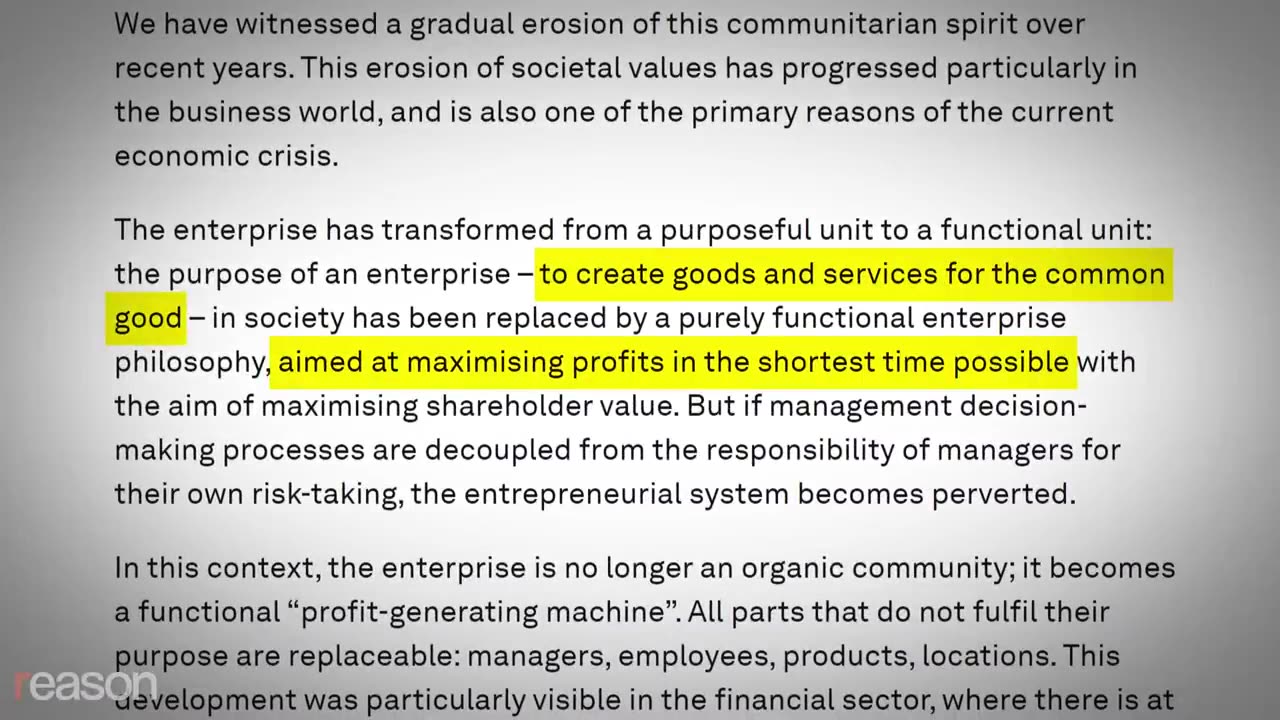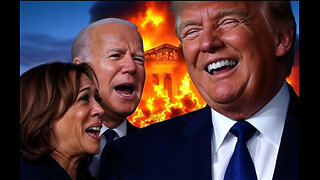Premium Only Content

Forget the Great Reset. Embrace the Great Escape.
Reason is the planet's leading source of news, politics, and culture from a libertarian perspective. Go to reason.com for a point of view you won't get from legacy media and old left-right opinion magazines.
----------------
"The coronavirus pandemic has no parallel in modern history. It is our defining moment."
Those are the words of Klaus Schwab, head of the World Economic Forum (WEF), in COVID-19: The Great Reset, the 2020 book he co-authored with Thierry Malleret.
"Many of us are pondering when things will return to normal," they write in the book's introduction. "The short response is: never."
At the latest WEF meeting in Davos, Switzerland, this January, Schwab set the tone for the conference with his glowing introduction of the opening speaker: Xi Jinping, China's president and chairman of the Chinese Communist Party
"Major economies should see the world as one community… and should coordinate the objectives, intensity, and pace of fiscal and monetary policies," said Xi in his address to the WEF.
This vision of a united globe with a coordinated economy managed by experts captures Schwab's vision of the post-COVID world. "We have to redefine the social contract," said Schwab at a 2020 WEF book launch event for The Great Reset.
These grand proclamations, the ominous book title, and Schwab's odd personal style have led many people to speculate that the "great reset" is part of a conspiracy of global financial elites and politicians to depopulate the planet so that they can more easily institute one-world government, or even that COVID was engineered to that end.
I don't buy it. Far-reaching, global conspiracies require levels of coordination and shared purpose likely to be quickly exposed and fall apart, especially in the networked age. Instead of spinning our wheels searching for a secret agenda, take a look at the one right out in the open.
"I think we are moving from short-term to long-term, from shareholder capitalism to stakeholder capitalism," said Schwab at his 2020 book event.
What Xi, the WEF, and people like Sen. Elizabeth Warren (D–Mass.) have in common is that they favor so-called stakeholder capitalism, which is a euphemism for making companies answer first to special interests. They want to reorganize corporate boards to include representatives from labor, environmental, and social justice groups. Warren proposed a bill to require 40 percent of large corporate board seats be elected by workers. In China, the state simply owns or controls a majority stake in most of the country's largest firms.
Written and produced by Zach Weissmueller, animation by Tomasz Kaye, additional graphics by Nodehaus
Photos: CHINE NOUVELLE/SIPA/Newscom; CHINE NOUVELLE/SIPA/Newscom; Li Tao / Xinhua News Agency/Newscom; Ken Cedeno / Pool via CNP / SplashNews; Ahmad Abdo/dpa/picture-alliance/Newscom; Ed Lefkowicz / VWPics/Newscom; Albin Lohr-Jones/Sipa USA/Newscom; Li Xiang / Xinhua News Agency/Newscom; Kyodo/Newscom; CHINE NOUVELLE/SIPA/Newscom; Li Tao / Xinhua News Agency/Newscom; Lan Hongguang / Xinhua News Agency/Newsco
Stock footage: Timo from Peels; Alexander from
Music: "Thunder" by set licensed under Creative Commons Attribution; "Aqueous Pulse under Creative Commons Attribution.
-
 2:24:54
2:24:54
WeAreChange
10 hours agoTrump Sides With Musk On Visas! MAGA Base ENRAGED??
83.4K83 -
 2:04:26
2:04:26
Nerdrotic
10 hours ago $23.88 earnedThe Program: The Government's UFO Cover Up Programs | Forbidden Frontier #085
63.9K16 -
 2:13:07
2:13:07
vivafrei
13 hours agoEp. 243: HOLIDAY SPECIAL! The Great H1B Visa Debate! Jay z Gets Scorched! Attack in Germany! & MORE!
141K309 -
 16:40
16:40
Russell Brand
14 hours agoTHIS MASSIVELY BACKFIRED...
172K605 -
 25:41
25:41
SB Mowing
18 hours agoPICTURE living next to THIS and not knowing what to do…
124K64 -
 2:16:01
2:16:01
George Galloway
1 day agoNEW YEAR COUNTDOWN - MOATS with George Galloway - EP 408
128K237 -
 18:39
18:39
Stephen Gardner
14 hours ago🔥BREAKING! Trump's SHOCKING New Demand | Biden admits DOJ TARGETED Trump Illegally!
99.6K397 -
 1:20:23
1:20:23
Josh Pate's College Football Show
20 hours ago $15.35 earnedCFP Prediction Special: OhioSt vs Oregon | UGA vs Notre Dame | Texas vs ASU | Boise vs PennSt
124K6 -
 7:50:03
7:50:03
Scottish Viking Gaming
18 hours ago💚Rumble :|: SUNDAY FUNDAY :|: Virginia has two Verginers, Change my Mind!
129K18 -
 1:49:50
1:49:50
Winston Marshall
2 days agoThe DARK Reality of Socialism - Historian Giles Udy
101K128